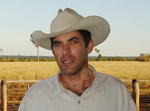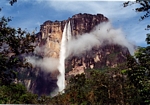FEATURED ARTICLES [Latest news updates]
Rare and mysterious forests of Sulawesi 80% gone
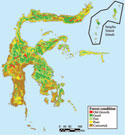
|
|
(06/28/2007) Roughly 80 percent of Sulawesi's richest forests have been degraded and destroyed for agriculture, logging, and mining, reports a ground-breaking assessment of the Indonesian island's forests. Straddling the Wallace line, an area of biological discontinuity between Asia and Australia, Sulawesi is characterized by high levels of endemism--more than 60 percent of its mammals and more than one third of its birds are found nowhere else on the planet. Nevertheless, despite this species richness, Sulawesi's biodiversity is poorly known by scientists. More troubling, the island has long been overlooked conservationists. Their neglect has been costly--Sulawesi's forests have fast been converted for agriculture, felled by loggers, and degraded by miners. A new study, published in the journal Biotropica reveals the extent of these losses by creating an extensive ecosystem disturbance map of the island.
[
Indonesia]
Ecotourism is working in Costa Rica:
An interview with author and eco-lodge pioneer Jack Ewing
(06/12/2007) In 1970 a young man went to Costa Rica, a place he initially confused with Puerto Rico, on an assignment to accompany 150 head of cattle. 37 years and several lifetimes' worth of adventures later, Jack Ewing runs a eco-lodge that serves as a model for a country now considered the world leader in nature travel. Ewing tells his story and dozens more in a new book, Monkeys Are Made of Chocolate. Weaving science, humor, and personal anecdotes into a collection of essays, it quickly becomes evident that Ewing has changed lives and made his made his part of the world a better place.
[
Happy-Upbeat Environmental | Costa Rica]
A Wiser Earth?
World's largest movement has no leader but 100M employees
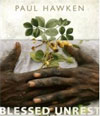
|
|
(06/11/2007) The world's largest movement has no name, no leader, and no ideology, but may directly involve more than 100 million people, said a green business pioneer. Speaking Friday at a talk sponsored by the Long Now Foundation, Paul Hawken, co-founder of garden supply store Smith & Hawken and today recognized as a leader in eco-minded business and green design, spoke about two of his latest projects: Blessed Unrest, his new book tracing the emergence and growth of this still unnamed movement, and WiserEarth.org, an online community that embodies concepts explored in his book by networking more than 100,000 environmental and justice organizations.
[
Happy-Upbeat Environmental | Technology]
98% of orangutan habitat gone in next 15 years

|
|
(06/12/2007) Indonesia is losing more than 2.1 million hectares (5.2 million acres) of forest a year to illegal loggers, states a new report from the U.N. Environment Program (UNEP). The report, which estimates the value of illicit timbering at $4 billion annually, warns that 98 percent of Indonesia's lowland forests will be gone by 2022, putting species like the orangutan at risk of extinction in the wild. The report, Last stand of the Orang-utan: State of Emergency, was released Monday at the Convention on International Trade in Endangered Species meeting in The Hague.
[
Indonesia]
Nobel prize winner debates future of nuclear power

|
|
(06/07/2007) Two renowned energy experts sparred in a debate over nuclear energy Wednesday afternoon at Stanford University. Amory Lovins, Chairman and Chief Scientist of the Rocky Mountain Institute, an energy think tank, argued that energy efficiency and alternative energy sources will send nuclear power the way of the dinosaurs in the near future. Dr. Burton Richter, winner of the 1976 Nobel Prize in physics, said that nuclear would play an important part of the future energy portfolio needed to cut carbon emissions to fight global warming.
[
Nuclear energy | Energy]
An interview with John Cain Carter:
Cattle ranchers and soy farmers could save the Amazon
(06/06/2007) John Cain Carter, a Texas rancher who moved to the the Brazilian state of Mato Grosso 11 years ago and founded what is perhaps the most innovative organization working in the Amazon, Aliança da Terra, believes the only way to save the Amazon is through the market. Carter says that by giving producers incentives to reduce their impact on the forest, the market can succeed where conservation efforts have failed. What is most remarkable about Aliança's system is that it has the potential to be applied to any commodity anywhere in the world. That means palm oil in Borneo could be certified just as easily as sugar cane in Brazil or sheep in New Zealand. By addressing the supply chain, tracing agricultural products back to the specific fields where they were produced, the system offers perhaps the best market-based solution to combating deforestation. Combining these approaches with large-scale land conservation and scientific research offers what may be the best hope for saving the Amazon.
[
Amazon | Featured | Interviews]
An interview with Dr. Daniel Nepstad:
Amazon rainforest at a tipping point
But globalization could help save it
(06/04/2007) The Amazon basin is home to the world's largest rainforest, an ecosystem that supports perhaps 30 percent of the world's terrestrial species, stores vast amounts of carbon, and exerts considerable influence on global weather patterns and climate. Few would dispute that it is one of the planet's most important landscapes. Despite its scale the Amazon is also one of the fastest changing ecosystems, largely as a result of human activities, including deforestation, forest fires, and, increasingly, climate change. Few people understand these impacts better than Dr. Daniel Nepstad, one of the world's foremost experts on the Amazon rainforest. Now head of the Woods Hole Research Center's Amazon program in BelÈm, Brazil, Nepstad has spent more than 23 years in the Amazon, studying subjects ranging from forest fires and forest management policy to sustainable development. Nepstad says the Amazon is presently at a point unlike any he's ever seen, one where there are unparalleled risks and opportunities. While he's hopeful about some of the trends, he knows the Amazon faces difficult and immediate challenges.
[
Amazon | Featured | Interviews]
Polynesians brought chickens to Americas before Columbus

|
|
(06/04/2007) New DNS analysis shows that Polynesians introduced chickens to South America well before Christopher Columbus first set foot in the New World. The evidence supports the theory that the Americas were visited by sea-faring groups from the East prior to the arrival of Europeans. Using carbon dating and analysis DNA to determine the origin of chicken bones discovered at El Arenal, an archaeological site in Chile, a team of researchers led by Alice Storey of the University of Auckland found that the birds were descended from Polynesian stock and were introduced at least 100 years before the arrival of Europeans on the continent. The findings undermine claims that chickens were native to South America or that they were introduced by Spanish or Portuguese explorers.
[
Ancient civilizations]
WWF condemns iron fertilization scheme to fight global warming

|
|
(06/28/2007) Environmental group WWF condemned a scheme by Planktos, Inc. (OTCBB: PLKT) to dump up to 100 tons of iron dust in the open ocean west of the Galapagos Islands. The firm claims the experiment will fertilize massive blooms of phytoplankton that will absorb carbon dioxide from the atmosphere and help fight global warming.
[
Carbon sequestration]
Domestic cats originated in the Middle East

|
|
(06/28/2007) A new study traces the origin of housecats to the deserts of the Middle East. Writing in Science, a team of researchers led by Carlos Driscoll of the University of Oxford report that housecats are descendants of the Near Eastern wildcat, Felis silvestris lybica, which has been domesticated from at least five maternal lineages in Israel, Saudi Arabia and other countries in the Fertile Crescent.
[
Mammals]
China to ban ozone-depleting CFCs
(06/28/2007) China has moved to ban the production of ozone-depleting chlorofluorocarbons (CFCs), according to a statement from the country's environmental protection agency. The action is in accordance with the 1987 Montreal Protocol to phase out the use of ozone layer-depleting products . China, which signed the agreement in 1991, says it will end all CFC production by 2010.
[
China]
Peanuts, cotton, squash first farmed in Peru 6,000-10,000 years ago
(06/28/2007) The ill-fated Biosphere II project, an experiment that attempted to re-create Earth's ecosystems inside a greenhouse in the early 1990s, will live on as a scientific laboratory after the University of Arizona (UA) said it would develop the facility into a research center.
[
Archeology]
Madagascar rainforests get World Heritage Listing
(06/27/2007) The World Heritage Committee has named the rainforests of Madagascar as one of three new UNESCO World Heritage List sites.
[
Madagascar]
Biosphere 2 lives on
(06/27/2007) The ill-fated Biosphere II project, an experiment that attempted to re-create Earth's ecosystems inside a greenhouse in the early 1990s, will live on as a scientific laboratory after the University of Arizona (UA) said it would develop the facility into a research center.
[
United States]
Set back for AES on rainforest dam project in Panama
(06/26/2007) The World Heritage Committee moved to assess threats to La Amistad International Park, a World Heritage site shared by Panama and Costa Rica, from AES Corporation's planned construction of four hydroelectric dams on the park's border. The decision was based on an April 2007 petition from the Center for Biological Diversity and more than 30 other organizations in the United States, Panama, and Costa Rica.
[
Panama]
Antibiotic-free chicken may boost profit at Tyson
(06/26/2007) Tyson's decision to produce all of its branded chicken without antibiotics could spur growth at the poultry producer, reports The Wall Street Journal.
[
Agriculture]
Climate change is making poison ivy worse
(06/26/2007) New research shows that climate change is making poison ivy more potent, according to an article in The Wall Street Journal.
[
Impacts of Climate Change]
70% of Indonesia's mangrove forests damaged
(06/25/2007) 70 percent of Indonesia's remaining mangrove forests are damaged due to human activities, ANTARA News reported a local expert as saying.
[
Indonesia]
Past global warming produced monster penguins
(06/25/2007) Scientists have discovered fossil remains of a giant species of penguin that lived some 40 million years ago in what is now Peru. Coupled with the finding of a smaller species from the same time period, the remains reveal that early penguins responded differently to natural climate change than scientists would have expected. The results are published in the PNAS Online Early Edition the week of June 25-29, 2007.
[
Penguins]
Rainforest trees colonized Africa from the Amazon

|
|
(06/24/2007) A giant rainforest tree is helping scientists understand similarities between African and South American rainforests, reports research published in the journal Molecular Ecology. Studying seed dispersal in Ceiba pentandra, University of Michigan evolutionary ecologist Christopher Dick showed that the kapok tree species colonized Africa after the continents split 96 million years ago. Dick says that kapok seeds traveled across the Atlantic ocean, floating in the fluffy cotton-like fibers that surrounds them.
[
Amazon]
Indonesia pledges to cut haze-causing fires by half
(06/22/2007) Indonesia say it aims to reduce forest fires by 40-50 percent this year, following nearly a decade of devastating seasonal fires that release large amounts of CO2 into the atmosphere, threaten critical orangutan habitat, and raise regional health risks
[
Indonesia]
Industrialized countries outsource CO2 emissions to China
(06/22/2007) Facing criticism as it surpasses the U.S. as the world's largest producer of carbon dioxide, China says that industrialized countries are hypocritical for criticizing its greenhouse gas emissions while buying its products, according to the Associated Press. China argues that developed countries are effectively outsourcing emissions by shifting manufacturing to its factories.
[
Carbon dioxide | China]
Fuel efficiency boost wins unanimous Senate support
(06/22/2007) The U.S. Senate voted Thursday to raise fuel economy standards for cars and light trucks as part of the new energy bill.
[
Automobiles | Environmental politics]
Time running out for world's rarest gorilla

|
|
(06/21/2007) Time is running out for the world's rarest subspecies of gorilla, the Cross River gorilla (Gorilla gorilla diehli) from the mountainous border region between Cameroon and Nigeria. With less than 300 individuals remaining, conservationists have drawn up a new plan to save the great ape from extinction.
[
Gorillas | Conservation]
Photos by topic reorganized
(06/21/2007) Topical photo collections for the site have been reorganized to make it easier to find pictures. These sections will be updated whenever travel photos are added to the site.
[
Photos]
Study finds tropics absorb more CO2 than previously believed
(06/21/2007) Temperate forests are doing less than expected to offset climate change, while tropical forests are absorbing an unexpectedly high proportion of carbon dioxide from the atmosphere, reports a study published this week in the journal Science. The findings have implications for offset programs and climate policy.
[
Carbon dioxide | Forests]
Melting Antarctic icebergs help fight climate change
(06/21/2007) Icebergs breaking off Antarctica are unexpected hotspots of biological productivity and have a surprising role in climate change, reports a new study published in the journal Science.
[
Antarctica]
Google to be carbon neutral by year end

|
|
(06/20/2007) Google Inc. aims to be carbon neutral by the end of 2007, according to a statement posted on the Official Google Blog. The search giant plans to fight global warming by investing in and using renewable energy sources; reducing energy consumption by maximizing efficiency, and purchasing carbon offsets for the greenhouse gas emissions that it cannot reduce directly.
[
Green business | Renewable energy | Energy efficiency]
$100 billion invested in renewable energy in 2006
(06/20/2007) $100 billion poured into renewable energy and energy efficiency in 2006, a 25 percent jump from 2005, reports a new analysis by the UN Environment Programme (UNEP).
[
Renewable energy]
Most Americans back a $10 monthly global warming tax
(06/20/2007) 73 percent of Americans back a $10-per-month charge to underwrite renewable energy production reports a new survey by New Scientist Magazine, Stanford University and Resources for the Future, an independent think tank. The research indicates that 85 percent of Americans believe global warming in currently happening.
[
United States | Climate Change]
China surpasses the U.S. in CO2 emissions

|
|
(06/20/2007) China has surpassed the United States as the world's largest producers of greenhouse gas emissions, reports the Netherlands Environmental Assessment Agency (EEA), a group that advises the Dutch government. According to figures released by the agency, China produced 6,200 million metric tons of carbon dioxide last year, compared with 5,800 million tons for U.S. China's emissions surged by 8.7 percent in 2006, while those from the United States fell by 1.4 percent due to a slowing economy. CO2 emissions in China are now 8 percent higher than in America, whereas last year China's emissions lagged 2 percent behind those of the U.S.
[
China | Carbon Dioxide]
Amazon.com, eBay rank behind Yahoo, Google, Microsoft in global warming efforts
(06/20/2007) Amazon.com and eBay rank at the bottom of the list when it comes to reducing their impact on climate, reports a new analysis from Climate Counts, a nonprofit that works to promote responsible climate policy among corporations. Microsoft and Yahoo rank at the top of Internet and software companies rated, while Google is in the middle of the pack.
[
Green business]
Spring arrives 2 weeks earlier in Arctic due to climate change
(06/19/2007) Arctic summers are arriving two weeks earlier than just a decade ago reports a study published the June 19th issue of Current Biology. The research, based on phenology--the study of the timing of familiar signs of spring seen in plants, insects, birds, and other species--found that the arrival of spring is advancing at 14.5 days per decade.
[
Greenland-Arctic | Climate Change]
Google will put $10M towards plug-in hybrid cars
(06/18/2007) Google.org, Google Inc.'s philanthropic arm, today unveiled an initiative to convert hybrid cars to plug-in hybrid vehicles (PHEVs), a move that will cut carbon dioxide emissions, reduce oil use, and help stabilize the electrical grid.
[
Automobiles | Technology]
Coffee plantations may preserve some bird species in Costa Rica

|
|
(06/18/2007) Agricultural areas offer opportunities for conservation in deforested landscapes in the tropics, reports a study published in the April 2007 issue of the journal Conservation Biology by Stanford University biologists. Tracking 450 individuals of 11 species of birds in coffee plantations converted from tropical forest in Costa Rica, a team of researchers led by Cagan H. Sekercioglu, senior scientist at the Stanford University Center for Conservation Biology, found that some forest bird species can persist in agricultural landscapes by either adapting to forest clearing or by moving between the few trees left standing. The results offer hope that small conservation measures could preserve some biological diversity in deforested areas.
[
Agriculture | Conservation]
Venezuela: the most beautiful place I have visited
(06/18/2007) With apologies to Madagascar and the other 60-odd countries I have visited, southern Venezuela is the most beautiful place I have ever visited. The tabletop mountains known as tepui are as stunning as they are mysterious. While I haven't visited the area in more than a decade, I recently re-scanned the original shots from the trip. The pictures don't do it justice (most were taken with a disposable camera), but they provide a basic idea of the landscape. Separately I added some pictures from the Monterey Bay Aquarium.
[
Travel]
Is the Amazon longer than the Nile?
(06/18/2007) Brazilian researchers claim they have evidence proving that the Amazon is the longest river in the world, some 65 miles (105 km) longer than the Nile, reports BBC News.
[
Amazon river]
Mongabay launches in Bengali language
(06/15/2007) The rainforest site for children has launched in Bengla (Bengali) thanks to Pradeep Lodaya. Bengla is spoken by 230 million people.
[
mongabay in non-English languages]
U.S. bird populations plummet

|
|
(06/14/2007) Populations of some of America's most common birds have plummeted over the past forty years, reports a new analysis by the National Audubon Society. Some species have seen a decline of 80 percent. The study, which combines the National Audubon Society's Christmas Bird Count with summertime surveys by the U.S. Geological Survey, found California species were particularly affected, with populations declines of 75 to 96 percent for several species, including the Northern Pintail, Horned Lark, and Loggerhead Shrike.
[
Birds | United States]
France to see scorching summers due to global warming
(06/14/2007) Mediterranean countries will face a 200-500 percent rise in the number of dangerously hot days due to global warming, reports a study published in the June 15 Geophysical Research Letters.
[
Impact of Climate Change]
Dam protest leaves four dead in Sudan
(06/14/2007) Four people were killed and at least 10 wounded when police dispersed a group of protesters in Sudan, reports Sapa-AFP. The demonstrators had gathered to protest a dam in the Kijbar region. Local press said that police fired on group as they tried to attack construction equipment being used to build the dam.
[
Sudan]
African elephants get 9 more years of protection

|
|
(06/14/2007) African countries have agreed to extend a ban on ivory exports for another nine years. In a deal reached Wednesday at the meeting of the UN Convention on International Trade in Endangered Species (CITES) in The Hague, four African countries will be allowed to sell their ivory stockpiles to raise funds for conservation and community development efforts. The ivory had been intercepted from black market transactions and the sale by Botswana, Namibia, South Africa and Zimbabwe had been previously approved. The four countries say their elephant populations are increasing thanks to conservation and law enforcement efforts.
[
Happy-Upbeat Environmental | Elephants]
Mining gets approval despite recent species discoveries
(06/14/2007) Suriname will allow mining in a highly biodiverse tract of forest where 24 previously unknown species were recently discovered. The decision had been expected. Joyce Amarello Williams, Suriname's environment minister, said Wednesday that the government will take measures to protect wildlife while encouraging open-pit mining, according to the Associated Press. The move come nine days after Conservation International announced the results of extensive surveys that turned up dozens of "new" species including a psychedelic purple-and-black toad, 12 kinds of dung beetles, and six species of fish. The research was sponsored by two mining companies, BHP-Billiton Maatschappij Suriname (BMS) and Suriname Aluminium Company LLC (Suralco) (a subsidiary of Alcoa Inc.), hoping to mine the area for bauxite, the raw material used to make aluminum.
[
Mining | Suriname]
Indo-Chinese tiger spotted in China for first time in years
(06/13/2007) Scientists captured a wild Indo-Chinese tiger on film in a nature reserve in China's southeastern Yunnan Province, reports the Worldwatch Institute.
[
Tigers]
Massive wildlife population discovered in Southern Sudan
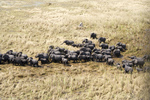
|
|
(06/12/2007) Aerial surveys by the New York-based Wildlife Conservation Society found more than 1.3 million white-eared kob, tiang antelope and Mongalla gazelle in Southern Sudan, despite decades of civil war. The population, which includes more than 8,000 elephants, rivals that of the legendary Serengeti in Tanzania and suggests that the region is of critical importance for conservation efforts.
[
Happy-Upbeat Environmental | Sudan]
Google, Microsoft launch energy efficiency initiative
(06/12/2007) Google, Microsoft, and other tech giants announced an energy efficiency drive to reduce computer power consumption by 50 percent by 2010. The scheme, dubbed the Climate Savers Computing Initiative, seeks to reduce the emission of greenhouse gases that contribute to climate change global warming.
[
Energy efficiency | Green Business | Technology]
Harpoon proves whale is 115-130 years old
(06/12/2007) A 19th-century weapon found in the neck of a 50-ton bowhead whale caught off Alaska shows that cetaceans can live more than 100 years, reports the Associated Press.
[
Whales]
World Bank to raise $250M for avoided deforestation in tropics
(06/11/2007) The World Bank will soon launch an "avoided deforestation" pilot project that will pay tropical countries for preserving their forests, reports The Wall Street Journal.
[
Carbon finance]
Slow loris trade banned
(06/11/2007) CITES delegates agreed to a total ban on trade in the slow loris, a Southeast Asian primate commonly trafficked for the pet trade. Environmental groups welcomed the move.
[
Pet trade | Wildlife trafficking]
Trade in sawfish banned
(06/11/2007) Trade restrictions for the endangered sawfish have been approved at the Convention on International Trade in Endangered Species (CITES) meeting the The Hague.
[
Fishing | Wildlife trafficking]
Google helps protect Amazon rainforest

|
|
(06/10/2007) Google is working with an indigenous tribe deep in the Amazon rainforest to protect their lands from illegal encroachment, reports the San Francisco Chronicle. For the first time, Google has confirmed details of the project. Working in conjunction with the Amazon Conservation Team, Google Earth's technology is being used to monitor illegal mining and logging that threaten the lands of the Surui tribe in Brazil. Google is working with satellite providers to significantly improve image resolution in some of the most remote parts of the Amazon basin. For the first time, Google has confirmed details of the project.
[
Amazon | Happy-Upbeat Environmental | Indigenous People | Technology]
Amazon tribe blocks major Brazilian highway
(06/08/2007) Indigenous Amazonians have blocked a major highway in the Brazilian state of Mato Grosso to protest a series of hydroelectric dams planned on the Xingu river, one of the Amazon's largest tributaries, according to Brazzil Mag and Survival International.
[
Amazon | Brazil | Indigenous People]
Archer Daniels Midland announces Amazon biodiesel plant start date
(06/08/2007) Archer Daniels Midland (ADM) plans to start operation of its $20 million biodiesel in the Brazilian state of Mato Grosso in early August, a company official said this week, according to MarketWatch.
[
Amazon Soy | Biodiesel | Brazil]
Sharks do not win CITES protection
(06/08/2007) Two endangered species of sharks failed to win protection at the Convention on International Trade in Endangered Species (CITES) meeting in The Hague.
[
Sharks]
Amazon deforestation rate falls 89% for April 2007
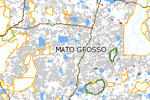
|
|
(06/08/2007) Deforestation rates fell by 89 percent in the Brazilian Amazon state of Mato Gross for April 2007 compared with April 2006, according to the System Alert for Deforestation, an innovative deforestation monitoring program backed from Brazilian NGO Imazon. Mato Grosso, which has suffered some of the highest rates of deforestation of any state in the Brazilian Amazon, lost 2,268 square kilometers of forest between August 2006 and April 2007, a decline of 62 percent from the year earlier period when 5,968 square kilometers were cleared.
[
Brazil]
Dorothy Stang fought for social equity in the Amazon

|
|
(06/07/2007) Dorothy Stang, an American nun who spent more than 30 years fighting for land rights for poor settlers in the Amazon, was murdered by a contract killer in February 2005 in the Brazilian state of Para. Stang, 73, was shot six times with a revolver as she read from the Bible. Stang's murder was a tipping point in the heated battle between the rural poor and large landowners in the state of Para. The federal government responded to her killing by sending several thousand armed troops into the state. Later Brazil established several protected areas in contested forests and proposed a land-use permit system for selling concession to loggers who agreed to set side land for settlers and indigenous groups. In a special editorial, Dorothy's brother David has written his thoughts on his sister's work in Brazil.
[
Brazil]
Logging roads rapidly expanding in Congo rainforest
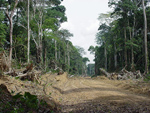
|
|
(06/07/2007) Logging roads are rapidly expanding in the Congo rainforest, report researchers who have constructed the first satellite-based maps of road construction in Central Africa. The authors say the work will help conservation agencies, governments, and scientists better understand how the expansion of logging is impacting the forest, its inhabitants, and global climate.
[
Congo | Logging | Roads]
Tiger parts trade must be banned to save great cats

|
|
(06/05/2007) Trade in tiger products must be banned if tigers are to survive in the wild, reports a study published in Bioscience. The paper, The Fate of Wild Tigers, characterizes the decline in wild tiger population as 'catastrophic' and urges governments to outlaw all trade in tiger products from wild and captive-bred sources as well as step up conservation efforts.
[
Tigers]
Illegal elephant ivory reaches the U.S.

|
|
(06/05/2007) Illegally poached elephant ivory is reaching markets in the United States reports a conservation group presenting at the wildlife trade conference meeting in The Hague. Care for the Wild International found 23,741 ivory items in surveys of stores in 15 American cities. The group said half the ivory pieces for sale in Los Angeles, San Francisco and Honolulu were imported illegally, while less than 10 percent of such goods on the east coast were illicit.
[
Elephants]
Glaciers speed up due to global warming
(06/05/2007) Antarctic glaciers are moving faster due to global warming, reports the British Antarctic Survey.
[
Antarctica]
Elephants respond to calls from friends, not strangers
(06/05/2007) Elephants can distinguish between friendly calls and those of strangers reports a new study covered in ScienceNOW Daily News. In 2004 Caitlin O'Connell-Rodwell of Stanford University discovered that elephants use low-frequency, partially infrasonic ground vibrations to communicate with each other from miles away. The pachyderms press their trunks against the ground to detect the calls.
[
Elephants]
Penguins in Alaska?
(06/05/2007) Penguins found in Alaskan waters likely reach the Northern Hemisphere by fishing boat rather than by swimming, report University of Washington researchers.
[
Penguins]
Rainforest educational resource launched in 19 languages
(06/05/2007) Mongabay.com, a leading tropical rainforest information web site, today announced the availability of a rainforest educational resource in 19 languages at world.mongabay.com. The site explains what constitutes a tropical rainforest, why they are important, why they are threatened, and how they can be saved.
[
Education]
Indonesia: No more rainforest clearing for palm oil
(06/05/2007) Indonesian Minister for Environment Rachmat Witoelar said Indonesia will not allow palm oil producers to clear primary forests for establishing plantations, reports Bloomberg.
[
Indonesia]
Rare kangaroos released into New Guinea rainforest
(06/05/2007) Indonesia released 17 endangered pygmy kangaroos to the rainforest of the Papua province of New Guinea. The marsupials has been confiscated from illegal traders and private collections.
[
New Guinea]
China Unveils Global Warming Initiative
(06/05/2007) China, soon to be the world's largest emitter of greenhouse gases, unveiled its first climate change initiative Tuesday.
[
China]
24 species discovered in Suriname

|
|
(06/04/2007) Scientists documented 467 species, including 24 species believed new to science, during a rainforest survey in eastern Suriname, South America. The expedition, led by Conservation International (CI), was sponsored by two mining companies, BHP-Billiton Maatschappij Suriname (BMS) and Suriname Aluminium Company LLC (Suralco), hoping to mine the area for bauxite, the raw material used to make aluminum. Conservation International said the Rapid Assessment Survey (RAP) will help "give miners guidance on protecting unique plants and animals during potential future development," according to a statement from the organization.
[
Species discovery | Suriname]
10-20% of birds extinct by 2100 due to global warming, deforestation
(06/04/2007) Ten to twenty percent of the world's terrestrial bird species could be threatened with extinction by 2100 due to climate change and habitat destruction reports a study published in the June 5 issue of the journal PLoS Biology. The numbers are in line with estimates published last year in The Proceedings of the National Academy of Sciences. Combining future projections on global warming, agricultural expansion and human population growth from the global Millennium Ecosystem Assessment with current geographic ranges of the world's 8,750 species of terrestrial birds, researchers Walter Jetz, David Wilcove, and Andrew Dobson estimate that 950 to 1800 species may be condemned to extinction by 2100.
[
Birds | Extinction and climate change]
Geoengineering could stop global warming but carries big risks

|
|
(06/04/2007) Using radical techniques to 'engineer' Earth's climate by blocking sunlight could cool Earth but presents great risks that could well worsen global warming should they fail or be discontinued, reports a new study published in the June 4 early online edition of The Proceedings of the National Academy of Sciences. Using computer simulations to model the impact of proposed experiments using a solar filter to block sunlight instead of reducing greenhouse gas emissions, an international team of scientists conclude that geoengineering a risky strategy.
[
Global warming mitigation | Climate Change]
Frogs rafted from South America to the Caribbean 29M years ago
(06/01/2007) Large populations of frogs in Central America and the Caribbean 'rafted' over the ocean from South America more than 29 million years ago, reports a new study published in the June 4 early online edition of The Proceedings of the National Academy of Sciences.
[
Amphibians]
Unknown tribe found in the Amazon
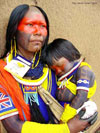
|
|
(06/04/2007) An unknown Indian tribe has been discovered in the Amazon rainforest reports the Associated Press. The Metyktire tribe, with about 87 members, was found in late May around 1,200 northwest of Rio de Janeiro. Brazil's Federal Indian Bureau (FUNAI) says the tribe is a subgroup of the Kayapo tribe and lives on the Kayapos' 12.1-million-acre Menkregnoti Indian reservation. Metyktire speak an archaic version of the Kayapo language. Men are naked except for penis sheathes and large lip-plates, while females shave the top of their heads.
[
Amazon people | Indigenous people]
Rural population decline may not slow deforestation
(06/03/2007) A new paper shoots down the theory that increasing urbanization will lead to increasing forest cover in the tropics. Writing in the July issue of the journal Biotropica, Sean Sloan, a researcher from McGill University in Montreal, argues that anticipated declines in rural populations via urbanization will not necessarily result in reforestation--a scenario put forth in a controversial paper published in Biotropica last year by Joseph Wright of the Smithsonian Tropical Research Institute in Panama and Helene Muller-Landau of the University of Minnesota. Wright and Muller-Landau (WLM) said that deforestation rates will likely slow, then reverse, due to declining rural population density in developing countries.
[
Agriculture | Deforestation]
Shark fin does not cure cancer
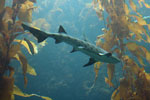
|
|
(06/03/2007) Shark cartilage, long believed in traditional medicine to be an anti-cancer agent, confers no health benefits in surviving lung cancer reports an extensive study presented at the 43rd annual meeting of the American Society of Clinical Oncology. Shark cartilage extract, AE-941 or Neovastat, did not offer health improvement versus a placebo in a trial of 384 newly-diagnosed untreated Stage III non-small cell lung cancer patients who also underwent chemotherapy and radiation treatment.
[
Health | Sharks]
Sale of elephant ivory to Japan approved
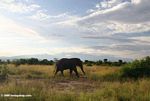
|
|
(06/03/2007) The Convention on International Trade in Endangered Species (CITES) approved the sale of 60 tons of elephant ivory to Japan prior to the start of a 12-day wildlife conference in The Hague, Netherlands. The agency, which oversees the trade in wildlife products, said that South Africa, Botswana and Namibia can ivory from stocks gathered from elephants that have died naturally. The proceeds will go to a conservation fund.
[
Elephants]
Most popular news articles for May
(06/01/2007) Most popular mongabay.com news articles for May 2007
[
Most popular]
Mongabay-kids launches in Polish
(06/01/2007) Thanks to Piotr Lukasik, the rainforest site for children is now available in Polish, in addition to 17 other languages.
[
world.mongabay.com]
Global warming will worsen fires in Australia
(06/01/2007) Global warming will put Australia at significantly higher risk of catastrophic bushfires said a leading climate scientists. Speaking at a climate conference in Sydney, Andy Pitman, co-director of the University of New South Wales's climate change research center, said that Australia will face a 100 to 200 percent increase in bushfire vulnerability by 2100 if greenhouse gas emissions aren't curbed.
[
Climate Change | Forest fires]
Hurricanes may help cool climate
(06/01/2007) Tropical cyclones and hurricanes play an important role in the ocean circulation patterns that transport heat and maintain the climate of North America and Europe, report researchers from Purdue University.
[
Climate Change | Hurricanes]






